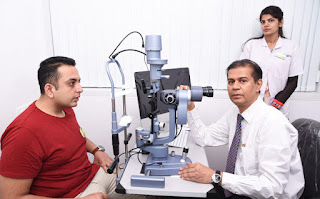Eye Donation: A Noble Task - Ojaseyehospital
Introduction
Disease in cornea may result in blindness. Approximately 6-8 million people throughout the world are blind due to problem in cornea. In India, approximately 6 million people have reduced vision due to corneal problem in one eye and the number of people with corneal disease in both the eyes is approximately 1 million.
More than 1,20,000 people are suffering from corneal blindness in India and there is an addition of around 25,000 to 30,000 patients every year. To cater such a large number of people, approximately 2,50,000 corneas are needed annually. Unfortunately, the corneal donation in India is 25,000 annually.
Facts About Eye Donation
Who can pledge their eyes?
Anyone can pledge their eyes irrespective of their age, gender, religion or even medical history. People who are suffering from diabetes, glaucoma and cataract can donate eyes. Even the people who wear spectacles can also pledge their eyes.
Only a part of the eye is used in transplant
The cornea is the outer and transparent part of the eyeball used for eye donation. The cornea receives a limited supply of blood hence it creates less of rejection problem in transplant.
Single eye donation can work for two recipients
To decrease corneal blindness the eyes donated by one person are transplanted to two people with two different corneal diseases causing corneal blindness.
Contraindication for eye donation
The people who are suffering from AIDS or any other spreadable infectious disease, such as cholera, hepatitis, Corona, meningitis, tetanus, and septicemia, cannot donate their eyes.
Eye donation is never refused.
If the eyes are not healthy for a corneal transplant, they can be used for clinical research.
High success rate
A corneal transplant has a more than 90% success rate.
Who Are Able To Donate The Eyes?
Eye donation has some criteria for donating eyes. It depends on the health condition at the time of death. Here are the criteria listed below
- People who are suffering from astigmatism can donate eyes. Cause astigmatism cannot affect the cornea of the eye.
- People wearing spectacles for corrective measures or short-sightedness & farsightedness can donate their eyes.
- A person who has no report of any communicable disease such as AIDS/HIV and other communicable disease can donate eyes.
- Patients with hypertension, asthma and diabetes can donate their eyes.
- A person who has undergone any cataract treatment or surgery may donate eyes.
The eyes that cannot be used for transplant can be donated for clinical research. The eyes of the donor should be closed immediately after death and should be covered with a moist cloth or ice packs.
What Is The Process Of Eye Donation In India?
The eyes can be donated only after the death of the person. The removal of eyes should take place within 4-5 hours after death. The eye must be removed by the registered medical practitioner. The team of eye bank will take the eyeball from the deceased person either from home or the hospital or nursing home where death has occurred .The eyes can be donated by the person itself by signing the pledge. The close relatives of the deceased are also eligible for allowing the eye donation even if a pledge is not signed by the person.
What Are Various Myths Associated With Eye Donation?
Face deformation
There is a religious misconception that after the eye donation, the face will suffer from deformation by having holes. In this process, the doctors remove only the cornea and part of the sclera which is the topmost layer of an eye.
Having a history of eye disease
If someone has glaucoma or cataract and treated or operated on, they can pledge for eye donation.
Senior citizen are eligible candidates for eye donation
Age is not in the criteria for eye donation. Anyone of the age of more than one year can donate eyes.
Eye donation is not an expensive procedure
Eyes cannot be bought or sold. Eye donation is purely a charitable act. However, eye transplant surgery may have surgical and post-surgical care cost.
You can pledge only before death
It is not necessary to pledge the donation before death. The family members can volunteer the process of eye donation after death.
Length of procedure
The myth is eye donation is a long process. However, the reality is the entire process of donating eyes takes 15-20 minutes only.
Next birth as blind
It is a religious myth that if you, donate your eyes in this birth it leads to blindness in the next birth. There is no scientific proof with this theory.
Conclusion
Eye donation is a noble act. The trend of donation with advanced technologies promises the world for providing more and more corneas to the affected people. The corneal transplant procedure is the gift of sight for someone in need. It is important that more and more people must join this fight against blindness and donate their eyes so that someone who is suffering from corneal blindness would be able to see this beautiful world.
Tag = Eye Hospital in Mumbai, Best Eye Hospital in Mumbai, Best Eye Surgeon in Mumbai, Ojaseyehospital, retinaindia

Comments
Post a Comment